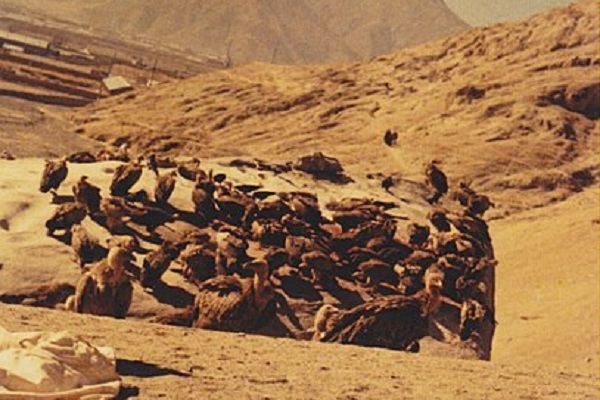Unit 6
Custom and Culture
Sky Burials
Key points from the text:
- Sky burial is a traditional Tibetan Buddhist funeral practice.
- In a sky burial, the body of the deceased is dismembered and fed to vultures.
- Sky burial is believed to help the soul of the deceased to reach a higher state of being.
- Sky burial is considered to be a very sacred and respectful way to dispose of the dead.
- It is not uncommon for foreigners to be forbidden from witnessing sky burials.
- The author and his family were fortunate enough to witness a sky burial while they were traveling in Tibet.
- The author was initially apprehensive about witnessing the practice, but he was ultimately impressed by the reverence and respect with which it was carried out.
- The author's children were also present at the sky burial, and they were able to understand and appreciate the cultural significance of the practice.
- The author and his family were deeply moved by the experience of witnessing a sky burial. They felt that it was a very special and meaningful event.
A. Choose the words from the box that match with the given meanings.
a. profound - very great
b. frenzy- a state of great activity and strong emotion
c. gruesome- very unpleasant and filling with horror
d. forbidden- not allowed
e. omen- a sign of what is going to happen in the future
f. fascination- very strong attraction
g. engrossed- involved in something with whole attention
h. pulverise- - to make something into a fine powder
B. Write True for true statements and False for false ones.
a. Foreign visitors are welcome to see Sky Burial rituals.
Falseb. The visitors are not allowed to take photos of the rituals.
Truec. The vultures took more than fifteen minutes to finish the entire corpse.
Falsed. The Tibetans perceive the body as a vessel for the soul.
Truee. The youngest son of the writer was busy with his toys.
Falsef. The author visited the burial sites with his wife and three children.
TrueC. Answer the following questions.
a. Why did the author visit a traditional Tibetan Buddhist monastery?
The author visited a traditional Tibetan Buddhist monastery to experience the secret ritual of Sky Burials.b. What did the author see on the hill?
The author saw about 100 vultures and a body bag on the hill.c. Why did the author give the iPad to his youngest son?
The author gave the iPad to his youngest son because he was too young to see the ritual.d. Describe the appearance of a Rogyapa, the body breaker.
The Rogyapa, body breaker, stormed up the side of mountain. He was dressed in a thick, dark scarlet coloured coat with a black hood. With a butcher knife in hand, he wasted no time in carving up the body.e. What did the body breaker do after collecting the bones?
After collecting the bones, the body breaker began to pulverise them with a mallet, and mixed that with yak butter and barley flour. He then walked into the middle of the vultures and threw the mixture high in the air.f. What is considered to be a bad sign?
It is considered a bad omen if vultures don't eat the body or even if small bits are left.g. Why did the author feel proud?
The author felt proud of his children's maturity and intelligence.Grammar I
A. Match the questions in column A with the answers in column B.
a. Are you ready?- v. Yes, nearly.
b. Can I carry something for you?- iv. No, it's OK. It's not that heavy.
c. May I use your phone? - ii. Yes, of course.
d. Has anyone seen my bag?- i. Yes, it's on the chair.
e. Would you like to come to a party?- iii. Yes, I'd love to.
B. How do you ask questions in these situations?
a. You want to know if it is raining.
Is it raining?
b. You want to know if Harish plays football.
Do you play football?
c. You want to know if the bus is on time.
Is the bus on time?
d. You want to know if your friend, Ramesh went to the market yesterday.
Did you go to the market yesterday?
e. You want to know if it is Tuesday today.
Is it Tuesday today?
f. You want to know if your teacher opened your letter.
Did you open my letter?
g. You want to know if your brother has gone to sleep.
Have you gone to sleep?
h. You want to know if there will be a food party.
Will there be a food party?
C. Circle the correct answer.
a. Are you busy today?
i. Yes, busy. ii. Yes, I am. ✔
b. Is it too hot in here for you?
i. No, it isn't. ii. No, I'm fine, thanks. ✔
c. Tell me, did you steal my money?
i. No. I won't ii. No, I didn't steal your money. ✔
d. Can I carry your bags?
i. No, you can't. ii. It's all right, thanks.✔
D. Write yes/no questions for these statements.
a. The family has got three mobile phones.
Has the family got three mobile phones?b. Januka works at the supermarket.
Does Januka work at the supermarket?c. Anita is learning English.
Is Anita learning English?d. The meeting will be held next Tuesday.
Will the meeting be held next Tuesday?e. Tanka switched off the computer.
Did Tanka switch off the computer?f. He went to the cinema yesterday.
Did he go to the cinema yesterday?g. Everyone is ready.
Is anyone ready?h. It is raining outside.
Is it raining outside?i. Vicky's lost her credit card.
Has Vicky lost her credit card?j. She'd done the work on time.
Has she done the work on time?Writing I
Write short essay about ‘Our Culture Our Pride’.







No comments:
Post a Comment